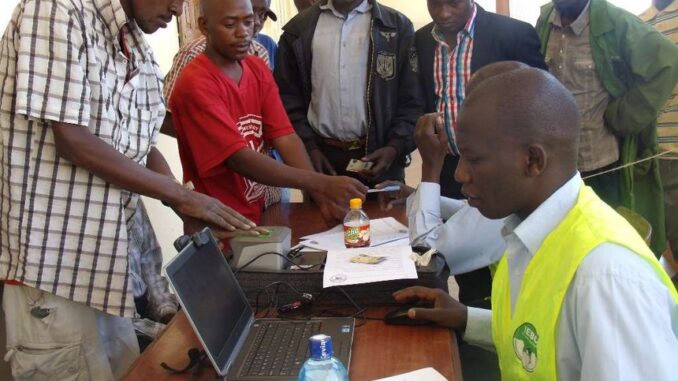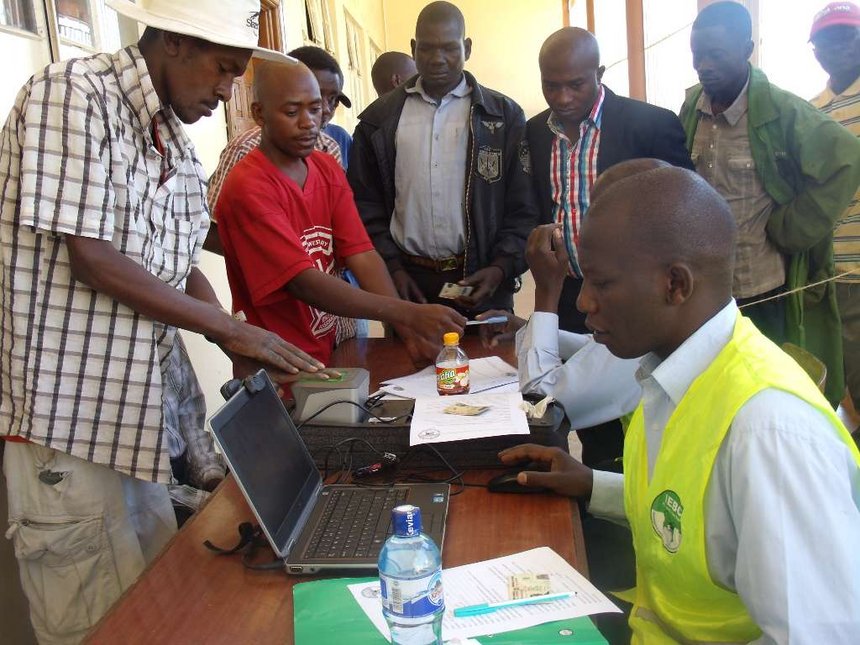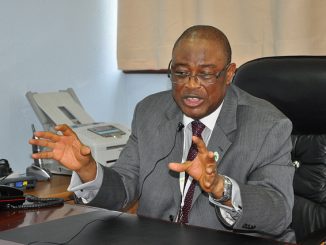
Voter Registration or Update of NCRA/ECSL Data to Be Used As Voter Register
By Sheriff Mahmud Ismail
Sunday September 4, 2022
On Saturday September 3 2022, the Electoral Commission of Sierra Leone (ECSL) started what is supposed to be the voter registration process ahead of the June 2023 general elections. But the inscription on the document issued at the end of this ongoing process says this is a ‘Voter Update’ not registration although curiously, the ECSL staffer responsible for updating/verifying the data is designated as ‘Registration Officer’ (RO).
Another thing, the process is expected to last for one month – between September 3 and October 4 but in strict sense the timeframe is just two weeks for each eligible individual to register. This is so because the period allocated to this process is not a straight one month across the country. Rather, the exercise has been split into two phases with two weeks allocated to each phase. The first phase spans from September 3 to October 17 and it is restricted to specified areas; whilst the second phase covering September 20 to October 4 is also set aside for other specified areas. Such a limited time allocation tends to further comfirm that this is not intended as a (fresh) voter registration but a mere verification and updating of existing data held by the National Civil Registration Authority (NCRA) and ECSL and using that as a basis for an individual to be enrolled as a registered voter for elections in 2023.
And here is why. A voter registration process usually allows the registrant’s photo to be captured, biometrics taken, in addition to their personal information plus an approved document for identification. Once this is done, a slip will be issued to the registrant bearing, among others, their name and signature, the district, area, center code, the date, and a unique confirmation number.
When I asked the ECSL officers (at the center where my data was verified) about the process, they told me that the updating/verification of existing data residing at ECSL and NCRA and the enrollment of new registrants are running simultaneously. “If someone had registered as far back as in 2012 with the ECSL (then NEC), or recently with NCRA, their data would be with us and we would only have to verify that data and update them where necessary,” said one of the ECSL staffers. Another ECSL staffer also stated that, “if no information is available for an individual, then we would have to register the person afresh.” Even they are divided on this last point. While some ECSL staffers say the new registration is for those who recently turned or would be 18 years by June 2023, others say the new registration caters for anyone aged 18 years and above who has not yet registered.
But on that first day of of this exercise, I saw an old woman being turned away because she didn’t have her NCRA slip against which her data were to be verified and she was not given any opportunity to provide her personal details for her to be registered. This afternoon, at the same centre, I witnessed another situation in which a young man who claimed to have registered in 2012 and 2018 could not be enrolled because according the ECSL RO, there was no record of him. Attempts to dig up his data using his names, biometrics, could not yield anything and he was not allowed to enroll afresh because the same ECSL staff said they didnt have that mandate.
There are few issues here. As I earlier stated, the ECSL staffers are inconsistent regarding the scope of their mandate. Also, the integrity of the databases of both ECSL and NCRA in terms of the completeness, accuracy, and dependability of the data they purport to have is questionable. Otherwise, keying in any of or a combination of certain search terms should bring out some results about anyone whose data had been captured rather than a ‘no data’ interface. The low capacity of the ECSL ‘Registration Officer’ also appears to be affecting the efficiency of the search output. To effectively interrogate databases usually requires certain levels of proficiency, particularly when working under the pressure of a political environment lacerated by mistrust.
All of these challenges come on the back of a very toxic political environment in which opposition parties strongly believed that ECSL is in bed with the ruling party to rig the elections.
Logistical Inefficiencies, Low Capacity of ECSL Personnel And Faulty Equipment
In my article titled: “Voter Registration Or Update Of NCRA/ECSL Data To Be Used As Voter Register,” I made the point that there is lack of clarity as to whether this is a voters registeration process or a mere verification of existing ones. I tried to establish how such lack of clarity is negatively affecting the exercise and casting doubts on the sincerity of the Electoral Commission of Sierra Leone (ECSL) to conduct free, fair and credible elections. In this piece, I will further highlight the concerns about ECSL’s commitment to a credible elections which would reflect the will of the voters in June 2023. This commentary will focus on the widespread and inordinate delays that have characterised the opening of centers, malfunctioning of equipment and downright incompetence of some of ECSL’s personnel.
When I went to ‘register’ on Saturday September 3, it was already 010:30hrs and the process had barely started. After an hour and half on the queue, I finally got in but had to wait another 45 minutes before I could present myself before the Registration Officer (RO) who requested my National Civil Registration Authority (NCRA) registration slip. But instead of that NCRA slip, it was my passport, which was one of the several national documents approved by ECSL, that I had on me. Looking at my passport, the RO keyed in my name and other personal information including my date of birth, address, father and mother’s names etc, but said she could not find my profile. The fact that she keyed in those items is suggestive that they are data fields which characterise the NCRA/ECSL databases and should serve as search terms for each profile. I also gave her my telephone number which I submitted during the NCRA registration. Unfortunately, nothing came up for me initially. I had to voluntarily step aside so that the other people in the queue could register. After a about 45 minutes, I went back and prevailed on the personnel to retry inputting my telephone number. It turned out that what she was keying in all the while were wrong numbers. Her colleague seated close by who heard the numbers I read out saw that the RO was keying in something else and drew her attention to it. As soon as she inputted my correct telephone number, my details popped up and we went through the verification of what’s on the screen. That was done by asking me to confirm my date of birth, the correct way my names are spelt, etc. This means that all of this verification was possible not because of my passport but because I had registered with NCRA.
Now, after this ardous process, the ECSL computer system should generate a Confirmation Number which should be part of the details to be written on the ‘Voter Update Receipt’ that should be issued to the verifier/registrant. But before she could write down that Confirmation Number attached to my profile, she mistakenly or deliberately clicked on a button that took her to an interface she was not familiar with and she did not know how to recall the interface which had my profile. This meant that she could not issue the ‘Voter Update Receipt’ which should serve as confirmation of my voter registration/verification/update. So she telephoned a couple of ECSL colleagues including her Ward Coordinator but none could help.
While this was happening, the computer operating system froze, further wasting precious time. Saddled with the problematic equipment, she informed me that her Ward Coordinator had advised her (via the phone) to note the incident relating to me and report to the office at the end of the day’s excercise. She was assured and so was I that the error will be sorted out by her superiors and that my voter registration/verification/update receipt will be issued to me on Sunday morning. I waited until after 14:00hrs on Sunday before I went there again and while I found the information ready, the RO was not. Writing the Receipt, she misspelled my surname even though it is correctly spelled in the system from where she was copying. When I drew her attention to the error, her next action horrified me. She simply untidily wrote over one of the letters like a child would try to efface a letter by writing another over it, making the document look like a forgery.
Three points worthy of note:
- If you didn’t register with NCRA, you would find it very difficult if not impossible to be enrolled.
The personnel handling the computer work (ROs), at least in my case and several others I have been told about, lack adequate training to effectively carryout their job.
The computers are faulty, possibly they are of very low RAM capacity such that they do not have enough space to handle the data.
I believe that the logistical, technical and human resource failures of the first and second days, which were mostly recorded in the strongholds of main opposition All Peoples Congress (APC) – the Western Area and the Northern region – could amount to a ploy at voter suppression.
It also means that the government of Sierra Leone has insisted on extracting NCRA data for voter registration inspite of the opposition parties’ about its integrity, the negative impact this could have on the electoral roll and, by extension, on fair and incredible elections.
It is therefore my considered view that the APC parliamentary leadership (the leadership of the Interim Transition Governing Committee is not dependable), should take these issues seriously, closely monitor the entire process across the country, document the lapses, and within the first three days to one week, produce a comparative analysis of what transpired and where. Based on that analysis, they should do a presentation of their findings to the media and the international community.
The APC parliamentary leadership should also engage its lawyers and other parties in the Coalition of Progressive Political Parties (COPPP) to look into the legality of using NCRA data for voter registration.




